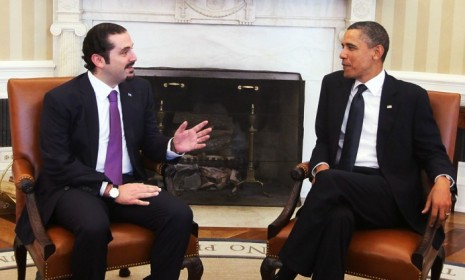Lebanon's government collapse: The fallout
Hezbollah and its allies break up the ruling coalition, leaving Israel's neighbor on the brink of turmoil

A free daily email with the biggest news stories of the day – and the best features from TheWeek.com
You are now subscribed
Your newsletter sign-up was successful
Lebanon's coalition government collapsed this week after ministers from the Hezbollah-led opposition resigned, plunging the country into renewed political instability after several years of relative calm. The dramatic move by Hezbollah — a powerful Shiite Muslim faction considered by the United States to be a terrorist organization — comes as members of the militant group are expected to be indicted by an international tribunal looking into the 2005 assassination of former prime minister Rafik Hariri. Hezbollah had been pressuring Prime Minister Saad Hariri, the slain man's son, to disavow the United Nations-backed investigation. What does the dispute mean for Israel, the Middle East, and the U.S.? (Watch an AP report about Lebanon's status)
This could endanger the entire Middle East: "These are dangerous moments," say the editors of The Telegraph. If Lebanon sinks back into the violence that plagued it until just a few years ago, "the boom that has followed decades of turmoil could be brought to a shuddering halt as violence resumes." And anything that strengthens the hand of Hezbollah could embolden its backers in Syria and Iran — which, given Iran's nuclear ambitions, is bad news for the whole region.
The Week
Escape your echo chamber. Get the facts behind the news, plus analysis from multiple perspectives.

Sign up for The Week's Free Newsletters
From our morning news briefing to a weekly Good News Newsletter, get the best of The Week delivered directly to your inbox.
From our morning news briefing to a weekly Good News Newsletter, get the best of The Week delivered directly to your inbox.
Hezbollah's power play is especially dangerous for Israel: Hezbollah's toppling of Lebanon's government caps its "rise from resistance group to ruling power," says Thanassis Cambanis in The New York Times. Hariri had to stand firm or "become a steward of Hezbollah's impunity." But he can't win this power struggle, because the "Party of God" will "stop at nothing — including civil war" to consolidate its influence in Lebanon and the Middle East, and to step up its "perpetual war against Israel."
"Hezbollah's latest suicide mission"
The Lebanese people will lose the most: "Lebanon is a fragile place," say the editors of the Beirut Daily Star, "but when there is stability," the nation can serve "as an oasis of investment, a symbol of diversity, and a hive of cultural and social activity." Despite its faults, the outgoing government did try to address the country's crushing social problems. If all sides treat each other with respect and re-think their positions, "perhaps Lebanon can find a way out of its impasse." If not, "a bleak future awaits."
"Time for Lebanese to re-think stances"
A free daily email with the biggest news stories of the day – and the best features from TheWeek.com
-
 The world’s most romantic hotels
The world’s most romantic hotelsThe Week Recommends Treetop hideaways, secluded villas and a woodland cabin – perfect settings for Valentine’s Day
-
 Democrats push for ICE accountability
Democrats push for ICE accountabilityFeature U.S. citizens shot and violently detained by immigration agents testify at Capitol Hill hearing
-
 The price of sporting glory
The price of sporting gloryFeature The Milan-Cortina Winter Olympics kicked off this week. Will Italy regret playing host?
-
 The billionaires’ wealth tax: a catastrophe for California?
The billionaires’ wealth tax: a catastrophe for California?Talking Point Peter Thiel and Larry Page preparing to change state residency
-
 Bari Weiss’ ‘60 Minutes’ scandal is about more than one report
Bari Weiss’ ‘60 Minutes’ scandal is about more than one reportIN THE SPOTLIGHT By blocking an approved segment on a controversial prison holding US deportees in El Salvador, the editor-in-chief of CBS News has become the main story
-
 Has Zohran Mamdani shown the Democrats how to win again?
Has Zohran Mamdani shown the Democrats how to win again?Today’s Big Question New York City mayoral election touted as victory for left-wing populists but moderate centrist wins elsewhere present more complex path for Democratic Party
-
 Millions turn out for anti-Trump ‘No Kings’ rallies
Millions turn out for anti-Trump ‘No Kings’ ralliesSpeed Read An estimated 7 million people participated, 2 million more than at the first ‘No Kings’ protest in June
-
 Ghislaine Maxwell: angling for a Trump pardon
Ghislaine Maxwell: angling for a Trump pardonTalking Point Convicted sex trafficker's testimony could shed new light on president's links to Jeffrey Epstein
-
 The last words and final moments of 40 presidents
The last words and final moments of 40 presidentsThe Explainer Some are eloquent quotes worthy of the holders of the highest office in the nation, and others... aren't
-
 The JFK files: the truth at last?
The JFK files: the truth at last?In The Spotlight More than 64,000 previously classified documents relating the 1963 assassination of John F. Kennedy have been released by the Trump administration
-
 'Seriously, not literally': how should the world take Donald Trump?
'Seriously, not literally': how should the world take Donald Trump?Today's big question White House rhetoric and reality look likely to become increasingly blurred